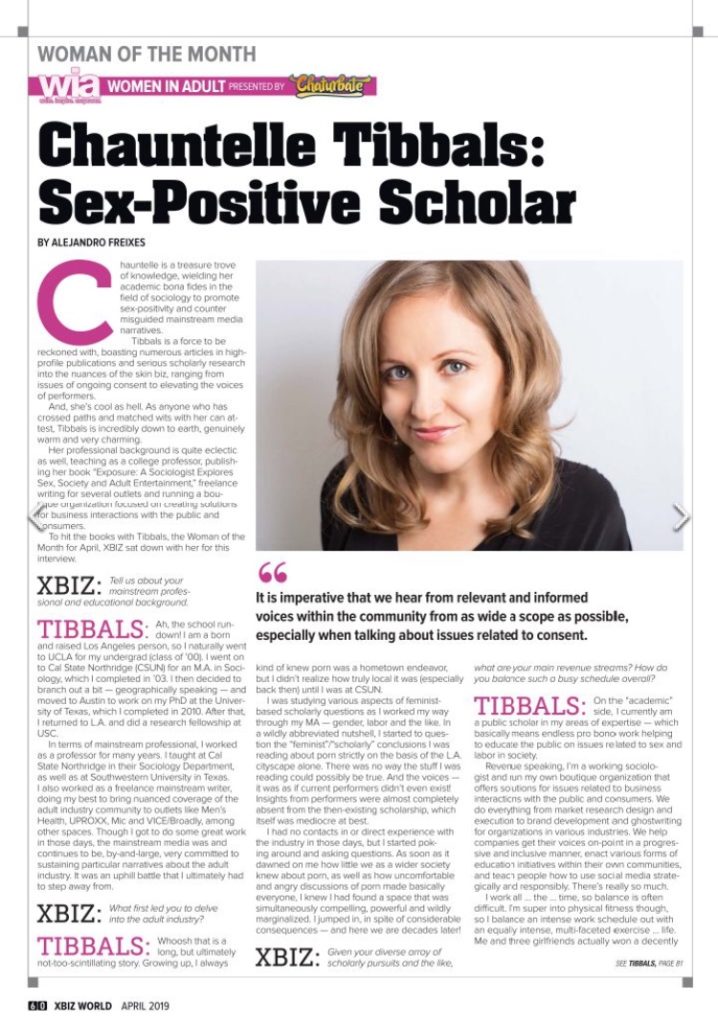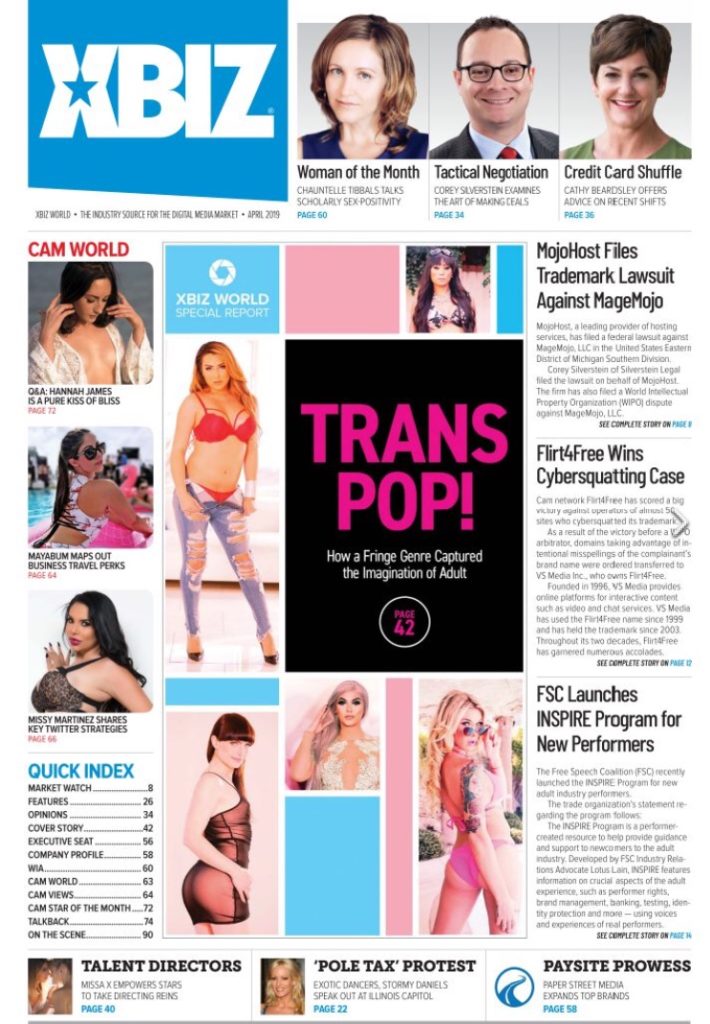What a fantastic honor! I was featured as XBIZ’s “Woman if the Month” profile for April, 2019.
You can read my original, unedited interview below, or you can read the polished up version that was published via XBIZ in their magazine on page 60 right here.
Enjoy!
XBIZ: Tell us about your mainstream professional and educational background.
DrCT: Ahh the school rundown! I am a born and raised Los Angeles person, so I naturally went to UCLA for my undergrad (class of ’00). I went on to Cal State Northridge (CSUN) for an MA in Sociology, which I completed in ’03. I then decided to branch out a bit — geographically speaking — and moved to Austin to work on my PhD at the University of Texas, which I completed in 2010. After that, I returned to LA and did a research fellowship at USC.
In terms of mainstream professional, I worked as a professor for many years. I taught at Cal State Northridge in their Sociology Department, as well as at Southwestern University in Texas. I also worked as a freelance mainstream writer, doing my best to bring nuanced coverage of the adult industry community to outlets like Men’s Health, UPROXX, Mic, and VICE/Broadly, among other spaces. Though I got to do some great work in those days, the mainstream media was and continues to be, by-and-large, very committed to sustaining particular narratives about the adult industry. It was an uphill battle that I ultimately had to step away from.
XBIZ: What first led you to delve into the adult industry?
DrCT: Whoosh that is a long, but ultimately not too scintillating, story. Growing up, I always kind of knew porn was a hometown endeavor, but I didn’t realize how truly local it was (especially back then) until I was at CSUN.
I was studying various aspects of feminist-based scholarly questions as I worked my way through my MA – gender, labor, and the like. In a wildly abbreviated nutshell, I started to question the “feminist” “scholarly” conclusions I was reading about porn strictly on the basis of the LA cityscape alone. There was no way the stuff I was reading could possibly be true. And the voices – it was as if current performers didn’t even exist! Insights from performers were almost completely absent from the then-existing scholarship, which itself was mediocre at best.
I had no contacts in or direct experience with the industry in those days, but I started poking around and asking questions. As soon as it dawned on me how little we as a wider society knew about porn, as well as how uncomfortable and angry discussions of porn made basically everyone, I knew I had found a space that was simultaneously compelling, powerful, and wildly marginalized. I jumped in in spite of considerable consequence — and here we are decades later!

XBIZ: Given your diverse array of scholarly pursuits and the like, what are your main revenue streams? How do you balance such a busy schedule overall?
DrCT: On the “academic” side, I currently am a public scholar in my areas of expertise – which basically means endless pro bono work helping to educate the public on issues related to sex and labor in society.
Revenue speaking, I’m a working sociologist and run my own boutique organization that offers solutions for issues related to business interactions with the public and consumers. We do everything from market research design and execution to brand development and ghostwriting for organizations in various industries. We help companies get their voices on-point in a progressive and inclusive manner, enact various forms of education initiatives within their own communities, and teach people how to use social media strategically and responsibly. There’s really so much.
I work all. the. time. so balance is often difficult. I’m super into physical fitness though, so I balance an intense work schedule out with an equally intense, multi-faceted exercise… life. Me and three girlfriends actually won a decently gnarly Crossfit-adjacent (it was NOT Crossfit, that’s just the most familiar descriptor I can think of) event last November even! Training for that sort of thing is a mandatory part of all my days, so that really helps balance me out. I also am mom to two rescue pitbulls, and they are the center of my world.
XBIZ: Discuss what new insights you’ve gleaned in the years following the publication of Exposure: A Sociologist Explores Sex, Society, and Adult Entertainment, which you released in 2015.
DrCT: Aside from obvious emerging trends and significant business shifts in the industry that have occurred in recent years, sadly, the main thing I have observed since Exposureis the sustained social marginalization of the industry. In fact, in many ways, I’d say marginalization has intensified.
It is very popular currently in mainstream media to support sex work, sex positivity, and occupational choices, and this is great – however, we do not see that progressive lip service translating into actual social change. Laws that have passed, policy changes and uneven enforcement of community guidelines on poplar online platforms, and the absolute lack of improvement in terms of pre-existing discrimination from banking to billing, etc. indicates society has pushed porn specifically and the sex industry in general at an even further arm’s length.
We tend to gloss over this though because, you know, Cardi B! (Cardi B is amazing, but her successes should not be seen as a metric for former sex workers everywhere, not even close.) The world feels more precarious to me since Exposure, not less so.
XBIZ: You’ve examined numerous porn trends ranging from the rise of “fauxcest” to Big Data-driven content creation. What have been the most surprising discoveries in your various research endeavors, that most defied your initial expectations?
DrCT: Honestly, nothing surprises me about human behavior, least of all about human sex-related behavior. I am not sure anything ever did, though some things about porn surprised me in my earlier days as I was going through my own process of replacing mainstream lore with actual facts.
I guess I could say though that humanity’s endless need for connections and the ways in which, in spite of so much judgment, the industry finds ways to facilitate those connections continues to astound me. In spite of being more connected to people – or, potentially connected – than ever before, we as a society are probably the loneliest we’ve ever been. Regardless of why, the industry seeks to alleviate that in some of the most creative and unique ways imaginable. I know it’s all business-related and whatnot, but we’d be remiss to forget the humanity that also informs this space. I continue to love the hell out of that.
XBIZ: For the 2019 XBIZ Awards, all ethnic-based categories were removed, not only to be more inclusive of such works in other award genres, but also to reflect the growing awareness (especially from talent on social media) of how such fetishizing can reinforce stereotypes, result in typecasting, etc. What are your thoughts on this complex and controversial issue?
DrCT: Complex and controversial is putting in mildly. These sorts of categories most certainly reinforce stereotypes, result in typecasting, and have myriad other effects that are, put simply, not good. But we also must remember that social interactions are synergistic. This includes everything from chatting with a friend to consuming a bit of media alone. Changes within the industry are a reflection of changes happening in wider society, as well as an artifact of changes happening within the community itself.
XBIZ: Given the rise of female directors to the fore of industry acclaim and influence, like twice-crowned XBIZ Director of the Year Bree Mills and 2019 XBIZ Feature Director of the Year Kayden Kross, how will this power dynamic impact content production behind the camera and in the public eye (or will it be business as usual)?
DrCT: Again, I hate to be all gloom and doom, but women have been working at all levels in the adult industry for decades. It’s wonderful that the community has recognized more women with top honors in recent years, but that doesn’t mean that women haven’t been right there all along. Stormy Daniels started directing in 2004, Angie Rowntree in the ‘90s, Candida Royalle in the ‘80s!
There are many others, and that’s not even to mention women who have shaped contemporary porn even further behind the scenes — office workers, publicists, executives, and more. Guess what? The public never cared before and, sadly, likely won’t care too much now. But that doesn’t mean that, as a community, the industry can’t strive to do better, be more supportive, and give recognition where it is deserved. If human social interaction is as synergistic as I believe that it is, then the industry’s evolutions and improvements with translate out into wider society – and once again, porn will help the rest of the world figure itself out!
XBIZ: You’ve moderated several key panels on consent, from the 2016 “Consent in Porn” panel jointly produced by XBIZ and Sssh.com, to the Mindbrowse.com “Porn, Production & Consent” roundtable at the 2019 XBIZ Show. In that three-year timespan, how has the industry’s approach to consent evolved?
DrCT: I don’t just moderate those panels — I also organize them. It is imperative that we hear from relevant and informed voices within the community from as wide a scope as possible, especially when talking about issues related to consent. I am super grateful that Sssh.com and Mindbrowse handle the production of those events, as I know nothing about that stuff, and leave me to do my best at trying to facilitate as nuanced a conversation as possible for each…
…because consent is incredibly important, both in wider social life and — in particular — in sex work and porn performance. I feel that considerations of consent, to varying degrees, have always shaped the adult industry. Sadly though, one thing the industry has never really been good at is maintaining a consistent, relatively predictable workplace for performers. To some degree, this is impossible. No workplace in any industry is fully predictable. In many ways though, porn is a black box. When civilians walk in as new performers, they are basically walking into the unknown. This is not good when thinking about preparing for a career in a stigmatized occupation.
Further, though there have been some efforts, which is great, there is no real process in place for resolving grievances, mitigating issues, and sanctioning wrongdoing. Couple all this with the struggles we have with consent as social humans in general (consent outside the industry is far from perfect – in fact, in many ways, may be in worse shape than one might argue the industry has been), and we are faced with an overwhelming responsibility to make sure that people not only know the ins and outs of the industry, but also are aware of and supported in the fact that they can say yes or no to any of it, at any time.
XBIZ: Any major career plans or goals for this coming year?
DrCT: I am actually working on two initiatives related to consent at the moment. Like everything in life though, time is the most significant factor. Who wants to come help me? I need you!

—
Got a sociology question? Need some social justice informed life advice? Contact Dr. Chauntelle right here.
Get your copy of Exposure: A Sociologist Explores Sex, Society, and Adult Entertainment on Amazon here.